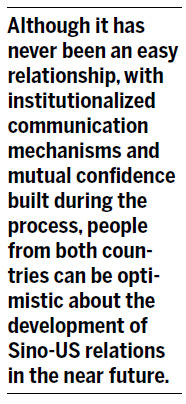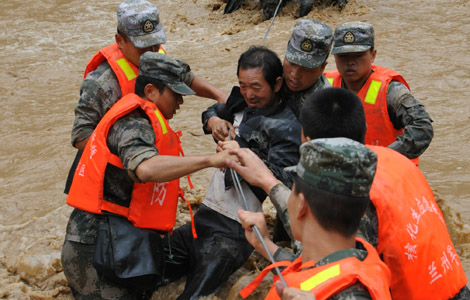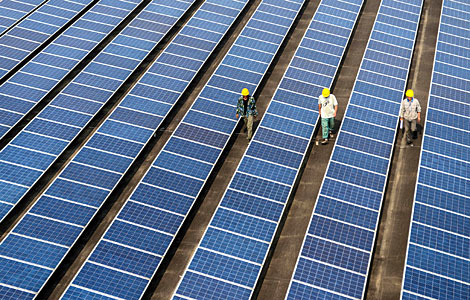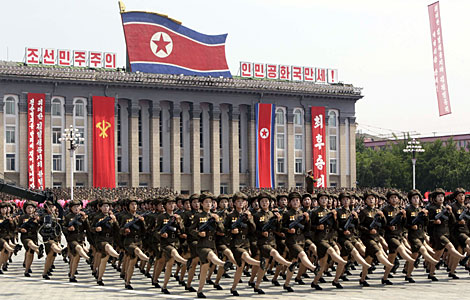Latest US-China talks should smooth the way
Updated: 2013-07-29 07:20
By Zhang Zhixin (China Daily)
|
|||||||||


The SE&D produced practical results that will help China and the US deal with some difficult issues on a variety of strategic fronts
Earlier this month, China and the United States successfully finished their fifth round of the Strategic and Economic Dialogue and the third round of the Strategic Security Dialogue. This round of talks was of great importance because both countries have just had changes of leadership and the bilateral relationship is encountering some difficulties such as cyber security and economic competition.
However, with the maturing of bilateral communication, people in both countries can be cautiously optimistic about the future of Sino-US relations.
Several results from the dialogues deserve to be highlighted.
First, the cyber security working group, which included top officials from both sides, met for the first time before the dialogue convened. Cyber security has been a headache for both countries for nearly a decade. The US has been complaining about Chinese hacking of US government and corporate networks. It has blamed China for stealing technological information for economic benefit without credible evidence. China itself has been suffering huge economic losses from cyber attacks and hacking and is unwilling to take the blame for the attacks on the US.
What makes the issue more complicated is that former US National Security Agency employee Edward Snowden revealed that the US hacked into the backbone servers at Tsinghua University in Beijing and Hong Kong University. Obviously, China is demanding an explanation for these activities. However, this institutionalized dialogue will ease friction and mitigate a possible flashpoint, which otherwise could have led to a larger crisis.
Second, bilateral cooperation on climate change has been renewed. The issue was a hot topic in the first term of the Obama administration, but due to strong opposition from the Republicans the administration's efforts had little effect at home or abroad. After Barack Obama's re-election, climate change resurfaced on his agenda and, during the summit last month in California, President Xi Jinping and President Obama agreed to continue their co-operation on this issue by phasing out greenhouse gases.
This time, both sides agreed to co-operate in five important areas: heavy-duty and other vehicles; smart grids; carbon capture, utilization and storage; collecting and managing greenhouse gas data; energy efficiency in buildings and industry. As the US and China are two leading producers of greenhouse gases, significant collaboration between them is essential to addressing the problem. Their cooperation can set a good example for the world and therefore boost all multilateral negotiations on reducing greenhouse gas emissions.
Third, both countries reaffirmed their commitment to strengthening military-to-military relations. These bilateral relations have long been prey to fluctuations in prevailing security situations. The mutual distrust and suspicion between the two militaries are quite obvious. The latest US Department of Defense assessment of the People's Liberation Army still says that China is challenging the dominant position of the US, which says China "continues to pursue a long-term, comprehensive military modernization program designed to improve the capacity of its armed forces to fight and win short-duration, high-intensity regional military conflict".
While the Chinese military is concerned about the US strategic rebalance toward the Asia-Pacific area, some analysts go further and argue that the US is trying to encircle or contain China. But military relations between the two countries have thawed considerably in the past two years, with many high-level visits and meetings at regional conferences.
During this round of the S&ED, both countries committed to raising military relations to a new level by reaffirming the visit to the US by China's Minister of National Defense in May and a reciprocal visit to China by the US Secretary of Defense in 2014. Both sides also agreed to continue discussions on the rules of behavior for military, air and maritime activities, a move which has long been proposed by military experts from both sides.
Fourth, both countries agreed to strengthen cooperation in macroeconomic policies. While the two countries are transforming their economic structures, competition is enormous. As one US China watcher says, the most competitive and important aspect of the Sino-US relationship has been and will continue to be economic.
While US concerns focus on market access and protection of intellectual property, the Chinese are paying more attention to security reviews of investments in the US and on American restrictions on technology exports to China. What's more, China and the US are promoting different visions of a regional trade agreement in Asia that would exclude the other.
The good news from this round of the S&ED is that both countries announced further concrete measures to support strong domestic and global growth, promote open trade and investment, enhance international rules and global economic governance and foster financial market stability and reform. And there was a clear message to the world: China will continue with its reform and opening-up policy, which will benefit both Chinese and Americans.
Last but not least, the US and China will continue their cooperation on regional and global issues. This dialogue emphasized the mixed picture of the international security environment for both countries. While the negative economic effect of the financial crisis is fading slowly, its political effect is still causing turmoil and instability in North Africa and western Asia. The US is withdrawing its forces from Afghanistan and rebalancing its strategic posture toward Asia and the Pacific area, with the aim of emboldening its regional allies to challenge China's sovereignty and territorial integrity.
With nuclear issues in Iran and the Democratic People's Republic of Korea unresolved, and Palestine-Israel negotiations stalled, the international security environment is sliding toward more uncertainty and insecurity. This round of dialogue highlighted several pressing security issues.
On the nuclear issues, both sides reaffirmed the fundamental importance of the peaceful denuclearization of the Korean Peninsula and their commitment to seeking a comprehensive and long-term solution to Iran's nuclear program. Agreement and consensus were also reached on Syria, Afghanistan and Sudan/South Sudan issues. On the controversial US rebalancing strategy, the two sides decided to work together to maintain peace, stability and prosperity in the region. The newly established US-China Maritime Safety Dialogue between the US Coast Guard and the China Maritime Safety Administration will improve mutual confidence between the countries and produce more co-operation on maritime security issues.
Relations between the US and China were fine before the latest S&ED. The earlier informal but successful summit held in California between President Xi and President Obama put relations back on track. Although it has never been an easy relationship, with institutionalized communication mechanisms and mutual confidence built during the process, people from both countries can be optimistic about the development of Sino-US relations in the near future.
The author is associate research professor at the Institute of American Studies, China Institutes of Contemporary International Relations. The views do not necessarily reflect those of China Daily.
(China Daily USA 07/29/2013 page16)
Most Viewed
Editor's Picks

|

|

|

|

|

|
Today's Top News
Experts advise CEOs on how to make it in the US
Israeli-Palestinian peace talks to resume
Latest US-China talks should smooth the way
Audit targets local government debt
30 people killed in Italy coach accident
Brain drain may be world's worst
Industry cuts cloth to measure up to buyers' needs
Reckless projects undermine the prosperity hopes
US Weekly

|

|
















